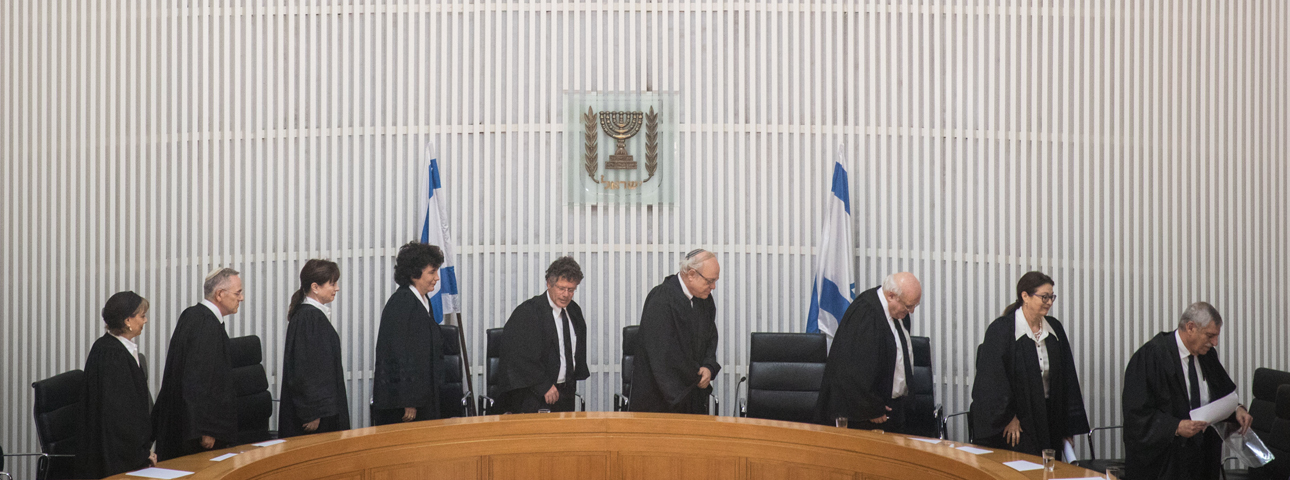The Return of the Override Clause? A Dangerous and Unnecessary Step
Laws define the legal rules of our democracy and ensure the stability of the political system while guaranteeing individual rights and general public interest - enactment of the Override Clause would seriously undermine this balance.

Supreme Court | Flash 90
According to several published reports, one of the key demands to be made by the Likud and several other parties during the negotiations to form a government will be a requirement that all its members of the coalition support a Supreme Court Override Clause. The passage of such a clause would allow the Knesset to re-enact laws that have been struck down as unconstitutional by the Supreme Court. The details of the text that will be submitted to legislation, and especially the majority required to override the court and how long the re-enacted law would remain in force before expiring or having to be passed again, remain uncertain. It is already clear, however, that this is a dangerous and unnecessary step.
Much has already been written about the danger that passage of the Override Clause would pose to the fundamental rights of every resident of the country. In a nutshell, the clause would give the Government unlimited power to infringe the rights of any resident who is part of a disenfranchised group, or is otherwise out of favor, and would deprive each and every one of us of the protection of the courts. It is not superfluous to repeat that since the 1992 Basic Laws that introduced key human rights protections, there have been very few cases in which the Court struck down a law passed by the Knesset, and that in most of them its ruling was aimed at protecting marginalized groups in the population and to prevent discrimination. It is also important to remember that even if public confidence in the Supreme Court has eroded in recent years — in part thanks to the relentless attacks on it by politicians — the Israel Democracy Index still reports much higher confidence in the Court (55%) than in the Knesset (30%) and political parties (16%). The recent elections demonstrated that the public did not rush to vote for parties whose platform placed special emphasis on cutting back the Court’s powers. It follows that that an Override Clause that would deprive the Court of the ability to defend individual rights while awarding the Knesset unlimited power to infringe individual rights runs counter to the public interest and would not win widespread support among the citizenry. In fact, a survey by the Israel Democracy Institute last year found that a majority of Israelis (56%) are opposed to an Override Clause.
What is more, the maneuver itself is unnecessary and of questionable political wisdom. The most important piece of legislation occupying the new coalition, the one in relation to which the Knesset is most likely to override the Court, is a new Conscription Law. This Law is required to fill the void left when the Court struck down the previous version, 18 months ago, because the arrangement it defined had failed to achieve the objective of a significant increase in the number of ultra-Orthodox men serving in the IDF in way that would decrease the level of harm to the principle of an equal sharing of the burden. The inability to reach agreement about a new text was the direct cause of the dissolution of the previous Knesset and the early elections.
In these circumstances, it is not clear what interest the political system has in passing an Override Clause. Such legislation, which would permit an ever more extreme Conscription Law than the version that was rejected by the Court, would severely limit the bargaining power of the parties in the coalition that are opposed to a blanket draft exemption for yeshiva students. It would also undercut the ability of those politicians who would like to find a compromise solution, because passage of the Override Clause would in effect eliminate the judicial boundaries within which the negotiations in the last months of the previous coalition took place, which led to a version that most of its members, both secular and religious, could live with. Elimination of the possibility that the High Court would intervene and strike down a law that severely undermines equality would leave the ultra-Orthodox parties with no incentive to compromise and place the coalition partners on an inevitable collision course. What is more, the disappearance of the constitutional checks and restraints could be expected to lead to other extreme demands by other members of the coalition, which would impair the Government’s ability to function and to promote the general public interest in other domains as well.
At the end of the day, our Basic Laws define the legal rules of the political game, in a way that ensures the stability of the political system while guaranteeing that politicians respect individual rights and keep the general public interest in mind. Enactment of the Override Clause and of a new Conscription Law freed of all constitutional restraints would effectively turn those rules into a dead letter and create a path for an end-run not only around the Court, but also around the rights of those who serve in the IDF and around the public interest in finding a fair and balanced arrangement for military conscription in Israel.
The article was published in Times of israel.
